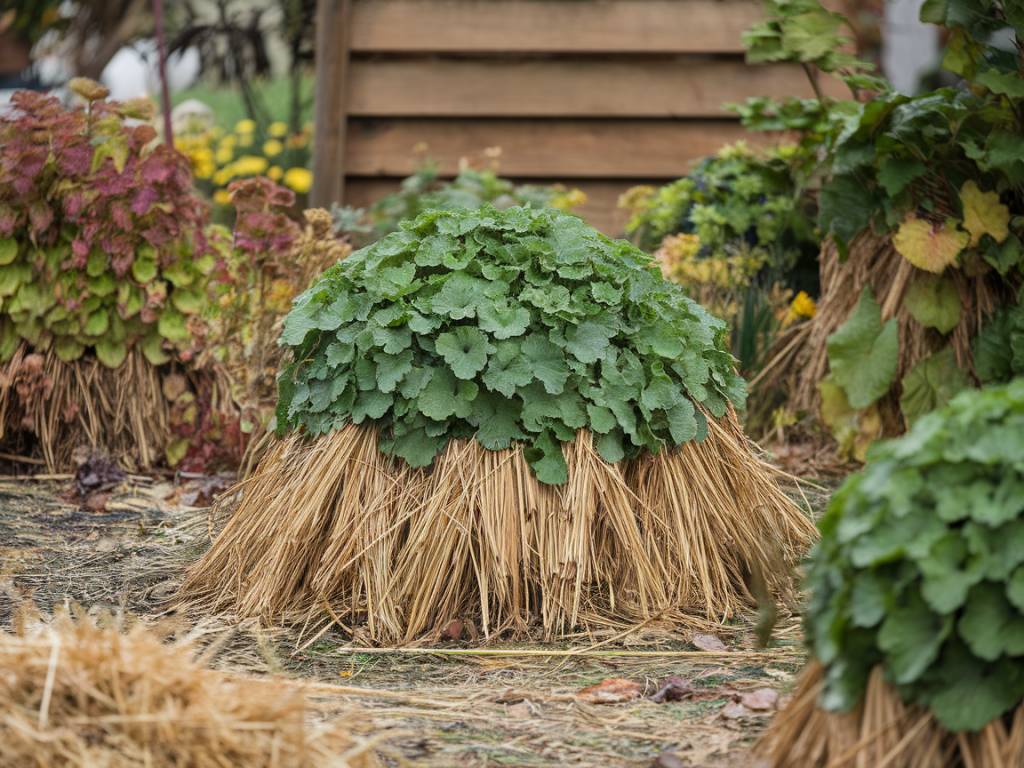As a dedicated gardener, I’ve always found winter to be a critical time for nurturing our perennial plants. These resilient beauties have the potential to grace our gardens year after year, provided we care for them correctly during the colder months. Here, I’ll share some timeless tips inspired by permaculture principles to protect both the roots and shoots of your cherished perennials.
Understanding Perennials and Their Needs
Perennial plants are those that live for more than two years. Unlike annuals and biennials, they have structures that allow them to overwinter, often underground. Roots, bulbs, tubers, and rhizomes are the key parts that carry these plants through the cold months.
During winter, the primary goal is to protect these structures from freezing temperatures and harsh conditions. Both the roots, which absorb nutrients and water, and the shoots, which will emerge in spring, need attention.
Mulching: Nature’s Blanket
Mulch is one of the most effective ways to insulate perennial plants. A thick layer of organic mulch, such as straw, shredded leaves, or compost, can create a protective barrier.
- Choose the Right Mulch: Organic mulches decompose over time, adding nutrients to the soil. Avoid using mulch that compacts easily, like grass clippings, which can suffocate roots.
- Apply Appropriately: Lay a 2-4 inch layer around the base of your perennials once the ground has slightly frozen. This will help retain soil moisture and regulate temperature.
Pruning: Less is More
While it might be tempting to cut back all the dead growth in autumn, leaving some of it can actually protect your perennials.
- Leave Some Stems: Certain perennials benefit from having old stems left in place. They can provide habitat for beneficial insects and offer some insulation against the cold.
- Selective Pruning: Remove only what is necessary, such as diseased or damaged stems. This prevents the spread of pathogens and allows the plant to use its energy more efficiently.
Watering Wisely
Proper hydration before the ground freezes is essential. Watering deeply helps roots go into winter well-hydrated.
- Deep Watering: Ensure your perennials get a good soaking before the first hard frost. Moist soil retains heat better than dry soil, providing some insulation for roots.
- Monitor Moisture Levels: In regions where winters are dry, occasional watering during milder spells can be beneficial. Avoid overwatering, as too much moisture can lead to root rot.
Using Covers and Cloches
Some perennials may require added protection, especially if they are not fully hardy in your region. Protective covers can be a gardener’s best friend during harsh winters.
- Garden Fleece and Cloches: These can be used to cover plants during severe cold snaps. They help to trap heat and protect plants from frost.
- Recycling Materials: Old blankets, sheets, or even plastic bottles can serve as makeshift covers. Just ensure they’re secured well to prevent them from blowing away.
Soil Health: The Foundation of Strong Roots
Healthy soil equates to healthy plants. Winter is a great time to focus on the foundation of your garden by nurturing soil health.
- Add Compost: Before the ground freezes, top dress your perennial beds with a layer of compost. This not only adds nutrients but also improves soil structure.
- Soil Testing: Conduct a soil test to understand its pH and nutrient content. Amend accordingly with organic matter to create a balanced environment for your plants.
Beneficial Creatures: Winter Allies
Permaculture principles emphasize working with nature. Encouraging beneficial insects and microorganisms can help maintain your garden’s health during winter.
- Insect Hotels: Create habitats for beneficial insects like ladybugs and bees. These can take refuge in your garden during winter and aid in pest control come spring.
- Microbial Life: Ensure your soil remains teeming with beneficial microbes by adding organic matter and avoiding chemical treatments. These microbes help decompose organic matter and improve nutrient availability.
Dealing with Snow and Ice
Snow can be both a friend and a foe to your perennials. While a blanket of snow can insulate plants, heavy snow and ice can cause damage.
- Snow as Insulation: Light, fluffy snow acts as a natural insulator, protecting plants from extreme cold. Allow it to remain undisturbed whenever possible.
- Removing Heavy Snow: When snow becomes too heavy, gently brush it off plants to prevent breakage and damage. Be cautious not to damage the plants while doing so.
Wind Protection
Harsh winter winds can dry out and damage perennial plants, especially those with exposed foliage.
- Create Windbreaks: Use fences, hedges, or even temporary structures like burlap screens to shield plants from strong winds.
- Plant Strategically: Place wind-sensitive perennials in naturally sheltered spots within your garden, such as beside a wall or larger shrub.
Monitoring and Adjusting
Permaculture teaches us to observe and interact with our garden. Continuously monitor your perennials throughout winter, adjusting your care as necessary.
- Watch for Pests: Some pests remain active during winter. Regularly check your plants and take action if you spot any signs of trouble.
- Respond to Weather Changes: Be prepared to adjust your plans based on the weather. Sudden temperature drops or heavy rainfall may require additional protective measures.
Winter care for perennials is all about balance. By using natural methods and paying close attention to the needs of your garden, you can help your perennials thrive through the cold months and burst back into life come spring. Remember, the principles of permaculture guide us to work with nature, not against it. By observing and responding to the needs of your garden, you’re setting up your perennials for long-term success.
Happy gardening!
Samanta
